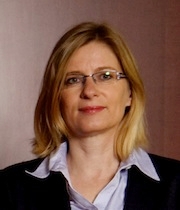Miljanic and Moeller Receive Prestigious NSF CAREER Awards
Award Honors Promising Junior Faculty Members

Angela Moeller

Ognjen Miljanic
Ognjen Miljanic and Angela Moeller, both assistant professors in the Department of Chemistry, have been honored with National Science Foundation (NSF) Faculty Early Career Development (CAREER) Awards.
One of the most prestigious grants offered by the NSF, CAREER grants are awarded to promising junior faculty members to help them build their research programs and establish a track record of successful investigations.
NSF CAREER Award recipients “exemplify the role of teacher-scholars through outstanding research, excellent education and the integration of education and research within the context of the mission of their organizations,” according to the NSF.
The five-year grants are awarded to tenure-track faculty members and each must integrate research with teaching. Miljanic’s grant is valued at up to $600,000, and Moeller’s grant is valued at up to $473,071.
Ognjen Miljanic: “Kinetic Self-Sorting of Dynamic Combinatorial Libraries”
Miljanic is studying self-sorting chemical systems, which are complex mixtures of many different compounds that are able to spontaneously order themselves and produce complex products in high yields and high purities.
The original self-sorting system is nature, which uses incredibly complex mixtures of simple chemicals found in biological cells to produce sophisticated proteins such as DNA and other molecules of life.
In contrast, traditional organic chemistry is highly reductionist. Typically, a chemist reacts two molecules in isolation to produce a third one, and then purifies this product before reacting it further. This approach is energy- and labor-intensive, but necessary since competing reactivities among the mixture components can completely derail the planned synthetic procedure. Miljanic and his team aim to circumvent this inefficiency of traditional synthesis by using equilibrating mixtures of compounds that can freely transfer material and information among the components, thus bringing this preparative method closer to the operation of natural systems.
“We do not intend to replicate nature. Instead, we plan to use this self-sorting behavior to expediently prepare sophisticated, but unnatural, molecules of interest in materials science, such as sensors for environmental contaminants, nano-sized capsules for gas separations, hierarchical structures for drug delivery, and the like,” Miljanic said.
Students in Miljanic’s group synthesize and characterize individual compounds using a mixture of spectroscopy and crystallography. The thorough characterization of components is essential to being able to deconvolute the behavior of a complex mixture as a whole.
“My students and I would like to initially demonstrate that different chemical reactions and physical stimuli (light, temperature) can be used to induce self-sorting behaviors,” he said. “This survey probably is not the most exciting component of our research program for the general public, but I think it will lay the groundwork for the development of complex self-sorting synthetic sequences that will come in two to five years.”
Angela Moeller: “Low-Dimensional Spin Systems: Interplay of Chemical Pressure on Triangular Lattices with Spin- and Orbital Degrees of Freedom”
Moeller is a fundamental materials research scientist who focuses on finding and developing textbook examples that will allow scientists to understand the inherent properties and mechanisms at work in certain materials.
Moeller and her research group synthesize new materials, using a range of experimental techniques to characterize their properties at the atomic level. The goal is to gain an understanding of the fundamental structure-property relationships so materials can then be synthesized for cutting-edge sensors and microelectronics devices.
“I love my work, and I am naturally curious, taking delight in unexpected results and finding pleasure in unraveling hidden secrets. I also deeply enjoy guiding students so that they develop the skills needed to address challenging and important problems,” Moeller said.
“The NSF CAREER grant represents a significant validation of the work we are doing, confirming that we are addressing problems at the forefront of materials research,” she said.
Moeller’s research will undoubtedly contribute to the general pool of scientific knowledge, which aims at identifying relevant features of a material class that may be tunable with respect to a predictable property and consequently will facilitate its utilization in an application.
Specifically, Moeller and her research group are dealing with a rare class of ferromagnetic insulators they can tune into “frustrated” anti-ferromagnets. With regard to applications, the phenomenological and theoretical description may allow them to establish new multiferroic systems that are needed for sensors and energy conversion in next-generation devices.
- Excerpted from UH news release by Laura Tolley, UH Communication